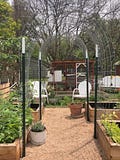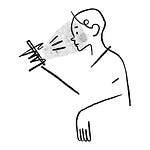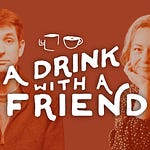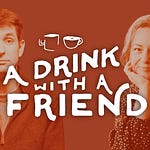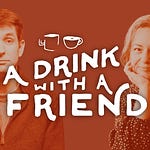We all know we’re supposed to care about the environment — but what does that look like with a sacramental posture? And what do we do about it besides tossing our plastic and cardboard in the recycling bin? Seth and Tsh admit their own challenges while recognizing the need to do more — sanely. After all, the other two Rs are more effective than the third.
Seth: Newsletter | Twitter | Instagram | Website
Tsh: Newsletter | Twitter | Instagram | Website
Support the show — buy the next round of drinks!
Subscribe to the show’s Substack
Find all the episodes
Tsh’s Rule of Life workshop
Praise Be to You - Laudato Si’, by Pope Francis
Why You Should Quit Recycling, by Shelbizlee
We Tried Going Zero Waste for a Month, Here’s What Happened, by WheezyWaiter
Silence, by Shusaku Endo
Scroll down for the transcript

Seth: Welcome to A Drink With a Friend, I’m Seth Haines.
Tsh: And I’m Tsh Oxenreider.
Seth: Tsh, what are you drinking?
Tsh: I’m drinking a fake vodka tonic. And I say fake because it’s not really tonic, it’s sparkling water out of a can.
Seth: I thought you were going to say it’s fake because it’s not really vodka.
Tsh: No, it’s real vodka. It’s cheap vodka. This is my…I was hoping for a gin and tonic because I prefer gin but we didn’t have any so whatever, better than a rum and tonic which we also had and that’s it. All it is, it’s sparkling water and it’s the flavor we had which is passion fruit and I squeeze lime in it and it’s my late afternoon—I cleaned the kitchen from top to bottom, as in dusted shelves, moved things around. This is my, okay, I’m going to sit for an hour and chat and have a drink and then get back to it. That’s what I’m drinking. What about you?
Seth: First of all, is that tasty? That feels like that would be interesting.
Tsh: It sounds gross. It sounds like a college student cocktail.
Seth: A little bit.
Tsh: It’s nothing fancy. I would not spend more than $4 on this, $3 at a bar. But it works for me. I’m easy if I’m not going to spend any money on it and I’m just at home. I barely drink at home. This is not a thing I normally do but I just am today. It’s fine.
Seth: Okay. Fine is better than not fine.
Tsh: That’s right. What are you drinking?
Seth: I’ll give you one guess and we’ll see if you can guess it.
Tsh: Okay, it’s either sweet tea or Arnold Palmer?
Seth: It’s not a sweet tea or an Arnold Palmer. It is tea from Chick-fil-a. For those of you who don’t know why Tsh was laughing, because she can actually see what I’m drinking and I showed her the cup. Hence her guesses. I’m to the point now where I don’t really like sugar in my drinks. It does something to me. It makes my whole face turn inside itself. I had, for whatever reason, at Easter, I had to use a Coke for something and I can’t even remember what it was but there was a half Coke left. I started to drink that half Coke and I was like, nope. No thank you. I think Lent ruined my taste buds.
Tsh: [laugh] Yeah, I’m not a big sugar drink fan at all. I only guessed sweet tea because of Arkansas. I’m not a sweet tea fan either. That makes sense for you, actually. I don’t know why I thought of sweet tea first of all.
Seth: No, mind as well take a shot, it’s what they are known for.
Tsh: It is what they’re known for.
Seth: Well, I mean, other than chicken, right?
Tsh: Yeah, and waffle fries.
Seth: That’s probably true.
Tsh: Okay.
Seth: I’m interested in the topic that you raised for today mostly because I’m terrible at what you’re talking about. Secondly, because I have serious questions about the practice as a general rule based upon some videos I’ve watched and some comments that some friends have made. Third, it’s an intriguing idea that I doubt can be actually implemented. With those caveats, with everyone’s interest now peaked, tell me, what are we talking about today?
Tsh: You beat me to my first question for you. I’m glad you just told me all that stuff because I was going to ask you what comes to mind when you hear the phrase, zero waste?
Seth: That’s a great question and I think what I picture in my imagination, come with me into my imagination, I picture a mid-fifties, sandy blond-haired woman with a lot of pigtails or ponytails in a hippie-ish dress making her home in the forest in a log cabin and generating no trash because everything comes off the land and at the end of every evening when she has a true zero waste day, she goes out and does whatever yoga move you do as the sun goes down. That’s what I think of when I think of zero waste.
Tsh: The epitome of the hippie lifestyle, I think. For me, it’s either that or the twenty-three-year-old guy who prides himself and talks about on YouTube owning three t-shirts and sleeps on a mattress on the floor and brags about how much trash he has in a year.
Seth: Yeah, the minimalist bro.
Tsh: Yes, which there is no shortage of on the internet. What’s funny to me is that, so this Lent, my fast was from shopping other than the essentials. We bought groceries and toilet paper and that was it. It was a weird thing that I heard God say because in my mind, I’m not a shopper. In fact, I hate going to stores, I hate spending needless money, I’m a natural saver. I thought it was really strange but I think the reason this fast was good for me this Lent was because something about the pandemic and being home made me a little quicker with the “Buy Now” button. I think I’m not alone. I’ve heard that from a lot of people. I didn’t buy needless clutter, really and truly. I bought what we needed. I was just quick to buy things. I didn’t stop to think, do we really need this? Is there something we can do without instead? Can I make do? All the things that I typically would pause and ask, it was just like, you know what? We’re in a pandemic, easy button here. A year in, Lent 2021, I need to temper this knee-jerk reaction a little bit. For the forty-six days of Lent this year, I didn’t buy anything. It was really fascinating and I found myself just quickly noticing how often I was quick to buy stuff before. I just wasn’t aware of it. It was a great practice for me and post-Lent, I had a few things dog-eared in my mind of what I was going to buy and I did but definitely much more slower and methodical. I had six weeks, a month to think about some of these purchases so I actually wanted them. But all this to say, part of my Lenten practice was also to do a little learning. I like to pair what it is I fast with adding something in my life and so I added some deep dives. My 5 wing is heavy. I like to nerd out and research and that’s what I did a lot of when I wasn’t writing my book. I researched zero waste and I just wanted to learn more. You’re not wrong when it comes to the stereotypes that are out there and I think the common trait of the two types that we just stereotyped a few minutes is, no kids. They are not people who have a lot of people that they live with and a lot of needs to meet and papers that come home from school and all the stuff. It’s a tall order to ask an average ordinary mom or dad or even just someone who goes off to work at a regular job to not produce any trash. It was never my intention to think this is my noble quest now. Even though, and God love them, there are people out there who really and truly do pride themselves on producing a quart-sized jar of trash per year. That’s their thing. That was not an interest to mine.
Here’s what I found really interesting. You know that I ended my long-running website at the end of 2020. This was a hobby turned job of mine that I started back when we lived overseas in Turkey. I had it running for twelve years and I loved it for most of that time. It started off being about living simply and this idea of living well off the land that you’ve been given. What I found is that I burned out on the topic because honestly, the environment, no irony there, of the topic out on the internet. It’s a very judge-y genre of YouTube channels and podcasts and blogs and people on social media, and I was tired of it. I would post something and people would question why I chose to travel or why there was a plastic bag in the background of my photos. It was like, okay, this is not reality, this is not sustainable. I say all this to say, I just can’t figure out the irony, now that I no longer do that for a job, my interest has peaked again.
Seth: Huh.
Tsh: Because my livelihood doesn’t depend on how green I look on the internet or something. I actually care again. I can psychologize that all day but it is what it is. It’s just a renewed interest of mine and I’ve been thinking about what it looks like, not so much, I don’t want to get into the practicals here, we can a little bit. But more the why than the how I guess. Why, those of us who are followers of Christ, why this should matter. I don’t know about you but in my Christian subculture growing up, this was not a thing. In fact, it was almost like a pendulum swing the other way.
Seth: Correct.
Tsh: The world’s going to burn so why do you care?
Seth: Just produce more plastic, it will just burn up too.
Tsh: I heard a lot, like from the pulpit, the only things that will live are the word of God and the souls of men. I heard that a lot so there was this idea of who cares about the trees and the rivers and the pollution?
Seth: Which is bonkers if you stop and think about it. Really, the truth is we’re the first, post-industrial revolution, but we’re the first subset of humans post-invention of plastic who are able to pollute to the levels we’re able to pollute. I don’t know if people in the Renaissance or Dark Ages were any more virtuous than we were, they just didn’t have the ability to pollute the ways we pollute. I think it’s the natural course that we would eventually make some sort of theological excuse for the ability to pollute the ways we do. That’s how I grew up, too. It was literally, the world is going to burn, why should you care? Or Jesus is coming back, he’ll come back before the oil runs out. Just all this craziness that made zero sense. It was crammed down your throat. Have you read Pope Francis’ encyclical Laudato Sí?
Tsh: I have read the high points and I’ve got it on my shelf and I have been saving it post-Lent, or post-book submission. I’ve got the hard copy. How about you? Have you read it?
Seth: Yes, I have. We actually studied it in a group. It was amazing. It’s an encyclical on care for our common home and it really just approaches this from actually caring for your neighbor. Caring for the world isn’t just caring for God’s creation, it is that, but it’s also ultimately caring for your neighbor. Because what we realize and experience and know from pollution is that pollution seems to aggregate, for lack of a better term, in places where there’s more poverty. We just push the problem down and down and down. Not only are we raping and pillaging the earth, but also a lot of that waste that is then generated is pushed down onto those with less privilege, those who can’t fight against it. You’ve been a traveler, you’ve seen that, right? You go to a place that is a little bit more on the downside of advantage and what do you find?
Tsh: This is probably where some of us who with good intentions look into things like zero waste or doing a little bit better with our stewardship and you just start feeling a little bit hopeless because when you look at the process of something from way more than farm to table if you look at something from the factory to the trash can, it feels nearly impossible because of how many people are involved and how our consumption really does affect those in poverty that don’t have the options that we have. You just start feeling a bit like, gosh, what can you do? Did you ever watch The Good Place, that comedy that came out?
Seth: Most of it. We never finished it and I don’t know why other than we got sidetracked or derailed and never went back to it.
Tsh: It’s fantastic. You don’t watch it for the theology, you watch it for the comedy. Nobody thinks I’m endorsing anything about what it has to say about how life really works. There was a lot of great philosophical insight in it and there was this one part when I don’t remember the details other than they had this number system for whether you make it into heaven or not. If you hit a certain amount of number then you get to go in and if you don’t you’re not allowed. They found that it had been 500 years or something since somebody had actually been admitted to heaven and they looked into like what’s the difference between this guy who brought flowers for his grandmother and this guy in the 1500s who brought flowers for his grandmother and what they found was all the way down to the ethical practices of how those flowers came to be. You’re basically complicit in some sort of system you never meant to be complicit in just simply by buying flowers at the grocery store. That’s how it feels, I think, in our modern era. We’re damned if we do, damned if we don’t. How is this even feasible? You’re right, zero waste is actually not possible in our world so it’s a bit of a misnomer.
Seth: That’s one of the questions that I had for you. When we talk about zero waste, and I’ll tease this out a little bit more in the what are we watching, listening to, or reading bit at the end. In looking at a little bit of the zero waste stuff, part of zero waste includes if I recycle this can or if I recycle this plastic bottle then that is not waste, right? I didn’t throw it away, it didn’t go in a landfill, therefore not waste. There are also a lot of reports that are saying, we’re not actually recycling our cans and our plastic bottles nearly like we say we are. In fact, in some situations, we’re selling those to other countries and allowing them to do whatever they want to do with them. You think about the fact that even if you’re selling it to a foreign country that’s recycling it you’re still loading it up on a container and your shipping it across the sea, it’s using fossil fuels. It seems to me that even recycling a can is not truly zero waste. What do people have to say for that? What do you have to say for that, Tsh Oxenreider?
Tsh: It’s 100% true. I think the statistic I heard is that roughly 9% of our recycling is actually recycled. Or the plastic that we throw in the recycling bin. Most of us have recycling bins that we take out to the curb a couple of times a month and most communities are single-stream. It used to not be so some places might still be multi-stream, but most of us now just throw everything in one bin and we leave it up to the recycling company to separate glass, cardboard, plastic, all that stuff. Most of us know, there are numbers on the plastic, one through seven, and they all mean different things. Who the heck knows what they mean? Unless you look it up, which I have as a little tab on my phone but it’s a pain to look it up. Here’s the thing, even if you do find out what the different plastics mean, each community has a different decision for plastic number four versus plastic number six. It’s very hard to know for your specific waste management company what they will do with that. You’re right, most of our recycling weirdly enough, goes to China and it makes no sense. But we have somehow figured out, we’ve crunched the numbers, it all comes down to money, that it’s cheaper for us to use a bunch of petroleum to ship it over to China where they have, in the past few years, passed a law that will only allow a certain number of recycling to even past their system. It’s something like .5% of our recycling actually passes their test of cleanliness. A lot of us just toss out peanut butter jars without spraying them out, you know? What will happen is they bundle recycling in hay bales and if there’s anything in there that’s dirty, they won’t take the entire bale. That’s why .5% of our recycling actually goes through their process which means they then throw our well-intentioned recycling into their landfill. I say that not to be a Debbie Downer because it really does suck.
Seth: Womp-womp.
Tsh: To say, we think we’re doing well and good just by throwing our plastic, or buying plastic because, hey, it’s recyclable, and then putting it in the bin but really we don’t know what happens. So, what do we do is your question? I think, and this is where I’m really intrigued in where I’ve been researching, is that we all know that little symbol with the three chasing arrows for recycling and Earth Day and all that good stuff? We only remember the third arrow, which is recycle. The first two are, is it reduce and reuse? Reduce, reuse, recycle. That’s what it is. We all focus on the recycling because we think, I don’t need to change my practices, I can buy and consume just as many goods as I was before because my municipality will recycle it and I don’t have to change my actual behavior. When really, recycling should be our last resort. We should reduce and reuse. That’s what I have been reflecting on a lot. There’s this World War II slogan back when the government was pushing bonds and rubber drives and victory gardens, that apparently we had a lot on signs and billboards and flyers, and it was, “Use it up. Wear it out. Make it do or do without.” That was a little slogan that was going around in the 1940s here in the United States. It was this idea of encouraging people that it is patriotic to not buy little Jimmy a new coat, instead patch all those holes again and again and again even if it’s a little too small. Just make it do or just go without until the war is over. This is the generation who also lived through the Great Depression. It really makes sense why, my grandparents are like this, they did not get rid of anything. They were borderline hoarders, which it can be taken to an extreme. We have forgotten what it means to live in a world where you just might not have everything. I think the closest we came was at the beginning of the pandemic when there was that toilet paper scare and suddenly you started realizing, oh, so this is maybe a tiny sliver of what that felt like. Like, I don’t know if I can get eggs or sugar. There’s something about our mindset now that we can’t fathom just going out and buying more and I think that’s become part of the problem with this idea of zero waste.
Seth: I guess back then in the war it was reduce or live without so that we can spin up a machine to generate, to make bombs and bullets and tanks.
Tsh: More plastic.
Seth: Plastic shields for bombers, whatever the thing is. I get that. The problem, I think, with modern society is that we have spooled up an economy that is so large that we are dependent on production, production, production. Produce, produce, produce. In fact, we’re so dependent on that that the federal reserve pumps out money, it produces more money to allow us to consume more goods so that the factories can keep churning to create more jobs. This is modern economics. It is my degree. I don’t use it that much anymore, though, which is a beautiful thing. A corollary to that is if we reduce consumption if we draw down and don’t buy as much stuff then what happens to the modern economy?
Tsh: Right. That’s the damned if you do, damned if you don’t, right? Take it a step further, sometimes people feel justified in saying, I want to buy, for example, this fast fashion t-shirt because that woman who sewed it for me in the factory, this is providing a real job, even if it’s an appalling wage and in terrible conditions. But not buying it aren’t we making it worse? I get that. I will say that we have had this conundrum in our world before. People said the same thing about slavery in the 19th century. I care about the plight of Black Americans but if don’t have slaves it’s going to be even worse. What will they be able to do and so, oh well. There has to be a point, I think, when we say but what can I do with what I’ve been given? That’s not to say just do the bare minimum but that is to say, if you’re not a Senator and if you’re not a lobbyist or a highfalutin lawmaker, perhaps you can’t change the law today but there are a lot of small things you can do that add up. I can start feeling a little fruitless if it’s just thing after thing and you don’t see much fruit. I’m not at all implying be perfect or if you accidentally forget your bag at the grocery store, your reusable bag, then just turn around and go home and don’t even bother buying the thing you need. I am thinking of the little bitty things that we can do that are basically voting with our dollars, is what it comes down to. There’s lots of ways to slice this but I think it comes down a lot to being more local and supporting our local makers, which is economy. That tends to have a lower carbon footprint because it was made down the street. There’s a little bit higher chance that you can find things that are made with less plastic because you can talk with the maker about it. I’m just thinking of a farmers market situation. You can bring your bag, hey, I want that pint of strawberries but you can put it in your bag and give her the plastic basket back and have her reuse it for the next person. Just small little things like that. A quote that comes to mind is from an essay by Wendell Berry who has written a lot about this idea, the sacramentality of the land and of agriculture. It’s The Agrarian Essays, I don’t know if you’ve ever read them?
Seth: Oh, yes.
Tsh: There’s this one where he talks about the unsettling of America in culture and agriculture and he says, and I think this is a little bit of what you were saying at the top of the conversation about how it has to be so much more about community, taking care of the earth has to be about loving our neighbors and not just this vague idea. He says,
“No settled family or community has ever called its home place an environment. None has ever called its feeling for its home place biocentric or anthropocentric. None has ever thought of its connection to its home place as ecological….this terms are culturally sterile, they come from the juiceless abstract intellectuality of the universities which was invented to disconnect, displace, and disembody the mind. The real names of the environment are the names of rivers and river valleys, creeks, ridges, and mountains, towns and cities, lakes, woodlands, lane road, creatures, and people.”
To me, that’s what it has to come down to when it comes to this pursuit of reducing and reusing and using recycling as a last result is what does it mean in your immediate environment? Yeah, that might mean buying a little less on Amazon. I’m not saying this in a high and mighty way, I’m talking to myself here, too. It means perhaps spending a few more dollars for that maker at the farmers market or down the street or at that one small shop even if it means having a little bit less. You know what I mean?
Seth: Yeah. I think there’s a real tension there. There’s a point at which, we talked about this, I have four kids. I have a wife and four kids and a house in the middle of America. I have a job. There are things that I have to do. There’s got to be a practicality that comes into play. There are times that I just need to drop by the store and buy something and that something is going to have plastic in it. There is a point at which you can’t make every right decision, back to the Good Place analogy. We all start at negative 1000 and it just keeps going backwards. But by the same token, I think holding that tension but also looking at what are the decisions that you can make to reduce waste is really important, and I’m terrible at it. I say that, I’m terrible at it in some ways, and in some ways, I’m super cognizant. I’ve had the same two sweaters for almost five years now. I have very few shirts. Maybe I’m one of those wardrobe minimalists bros? Outside of my workout clothes, I live very minimally and I’m very cognizant of that and that’s a very intentional and choice-full effort to do something good for the environment but then the minute I want a new camera or the minute I run out of guitar picks because who knows where they went, I buy another pack of 35 nylon guitar picks. I think there are a lot of ways in which I’m not super-choice-full. There are a lot of ways that I am. I think recognizing that it’s the ways that we are unthinking affects the first sacrament, the sacrament of creation, the earth. I think that’s where we start. Where are the places where I’m just not that aware and move into those spaces?
Tsh: I think there’s a sacramental beauty to living more aware of the things you’re using, you’re throwing away, you’re tossing in the compost bin, not to judge yourself, not to feel shame but just to be aware. If the average listener is anything like me, some of the problem is simply losing the thing again in the house. I think of your guitar pick. I know I have the thing, where is it again? My sunglasses, for the 18th time? It’s all well-intentioned. I don’t think we’re purposely going out and spraying smog out into the environment just for fun. It’s being more mindful, being aware, perhaps making some small shift in your daily life so that that kind of thing happens a little less. It sounds almost trite. Okay, pick a home for my sunglasses and that will save the earth? Well maybe not exactly but it will definitely bring more peace and less stress to your life and you won’t have to spend another $20 on sunglasses from Target again this year. It’s one small thing and perhaps that’s what we’re really getting at here.
Seth: I think that’s right. One thing that’s important, and your sunglasses from Target is actually a really good example. Five years ago, I decided to look for the things that I didn’t want to replace. I didn’t want to go through as many pens as I was going through. I didn’t want to have to keep replacing ponchos or rain jackets. I didn’t want to have to keep replacing sunglasses. I decided I am going to buy one really nice fountain pen. I am going to buy one really nice rain jacket. This sounds like a super privileged middle-class thing to do but it is what I did. I’m going to buy or obtain for Christmas, a nice pair of sunglasses. Because I have these things now that are a little bit nicer and certainly not crazy but because I have these things that are a little bit nicer, I keep up with them more. I pay more attention to where they are. I don’t lose them. I don’t misplace them. Because it wasn’t just a $5 pair of sunglasses that I’ll kind of regret and just go buy another piece of plastic, they’re actually nice sunglasses or it’s actually a nice rain jacket. That’s one thing that I found that actually holds me accountable on the fashion front to just say, I’m going to have one nice pair of shoes. I’m going to have one or two nice pairs of jeans. I’m going to have one nice rain jacket. Two good sweaters. And then just wear them until they cannot be worn anymore. You won’t lose them. You won’t lose them because you’ll feel like crap if you do.
Tsh: Right. I would say not only is it something about spending more on fewer items that makes us want to keep up with it, I think it’s also flat out having fewer things that makes it easier to keep up with. If you’re listening and you’re thinking, well, I would love a fountain pen but I can afford a Bic, consider perhaps only having a few of that thing and decluttering all the pens that no longer work. I know that sounds silly but I think to our family’s trip around the world whenever we all lived out of backpacks, I decided to scientifically experiment with this one pen. It was a cheap, I think it was a pen I literally got at the airport, a clicky ballpoint pen, how long can I keep this? I kept this one pen the entire time.
Seth: Wow.
Tsh: You ask me at home how often I lose pens of that nature, it was probably a couple of times a month because it was no big deal because you’ve got 27 more laying around the house. It was weird, I kept up with this one pen across thirty countries and it’s because if I lost it, I would have to seek out another pen. I made an effort to keep track of this cheap pen. Perhaps that’s a thing, too? Not only does it need to be nice, it just needs to be the one you have that will keep you from thinking, oh well, I’ll just get another one.
Seth: Look, I’m in an office right now, [shaking a cup of pens] sound effect for the listeners. There are no less than 23-24 pens in this one cup in an office of 8. 23 pens. It’s unnecessary. The reason we have so many pens is because they get lost. We don’t think about it, we lose them or misplace them or whatever. I think that’s a good point. The question is, do you still have that pen?
Tsh: [laugh] I do, actually. But of course, I have many more.
Seth: You need to take a photo of it and drop it in the show notes or on Instagram or something and show us what the pen looks like.
Tsh: I will. That’s a funny idea. This is probably where people are saying, okay, I agree with you. I want to waste less so what now then? We all know the Earth Day things of recycling or bringing the bags to the grocery store, I think that’s a common one. But what else? It really does come down to those three things in order and that first one, reduce, consider a lot of the free things that you do get like the trinkets from conferences, the free pens at the hotel, consider whether you actually need it and whether it would make your life that much better if you just snatched it because it’s free. Or just the things being handed out, the well-meaning samples at stores or farmers markets. You don’t need another koozie or any koozie, at all. Consider that. I can just think of a lot of small, practical things. That’s where my focus is, especially because some of this has become second nature to me by 12-13 years of caring about this but I’m still just one person in one small house. I’m going to be exploring a lot more of these practical things in the coming months this year in my Substack, so there’s a shameless plug. If you want to get into the practicals, I’m weirdly eager to rewrite and re-explore about this stuff now. Seth, I know you keep saying you’re bad at this, but is there one thing you do that you could say this is a good practice when it comes to being lower waste in my daily life?
Seth: For me, it’s only clothing. That’s the only area in my life that I’m good at it. I said, the things that I do is I’ve had this same sweater now for five years and I’ll probably have it another year. It’s not threadbare in the elbow yet. I think for me it’s literally managing the number of clothes I have. We have a really small closet so that helps. That’s probably the area that I have learned the most about but I’ll be interested to read along with you because I really don’t know. I actually don’t know that I believe it can be done. I will be interested to read your Substack to see if you’re actually able to do it in a way that’s meaningful. Going back to the minimalist bros, when I read these blogs or watch these YouTube videos or listen to their podcast, I always feel like there’s something hidden. Something that’s just a little bit like, really? There’s one that’s not that way that I really like to listen to. I don’t really feel like he’s misleading me but the rest of them, I’m like, really? Sometimes it feels a little bit psychologically unstable also, I’m just going to go out and say that.
Tsh: Uh-huh. It does. I was going to say it can actually add more stress to your life. That’s not necessary.
Seth: Totally. Completely anxious. I’ll be interested to read along on your Substack and see 1) have you found authentic ways to do this that don’t add stress to your life, and 2) what are the tips that we can glean from it?
Tsh: That’s what I’m excited about. I think ultimately it comes down to releasing the idea of zero waste as a goal because I don’t think it’s possible. We live in a linear economy, not a circular one, by and large. What are the small little circles we can add to make it lower waste to where we feel like we are living more in tandem with the divine? Because God is a God of creativity and rhythms and cycles and renewal and we get to participate in that, to bring it back to St Berry here. Another quote of his that I like is,
“The care of the earth is our most ancient and most worthy and after all, our most pleasing responsibility. To cherish what remains of it and to foster its renewal is our only legitimate hope.”
Seth: It’s so good.
Tsh: So good. Don’t despair if you’re listening to this. No shame for those plastic bags sitting next to your washing machine because I’ve got them, too.
Seth: With that as the closing word, I think that’s a great closing word, tell me, what are you listening to, watching, or reading that is making your life a little bit more good, true, or beautiful?
Tsh: I am still reading Rest, the book that we talked about last week. That is my non-fiction read, but I picked up, well, I assigned it to juniors and seniors in high school so I’m reading it with them. Have you ever read Silence, by Shusaku Endo?
Seth: Yes! Are you kidding me?
Tsh: Oh my gosh!
Seth: It’s brilliantly and excruciatingly beautiful.
Tsh: It really is. It’s a book I’m reading slowly because I love it so much. I love these characters. I looooove the messiness of it. That there is not this clear, this is what Jesus would do ending. The questions that it raises. Just the little bit that we discussed in my high school class was so well done. I say, so well done. These kids wrestled with such timeless questions of if someone asks you, are you a Christian and you say no, are you a Christian? It’s so great. I love going somewhere. Sometimes in novels that I just would never in a million years go, I would never go to 16th century Japan with warlords and the Jesuits and shoguns and that whole thing. It’s escapist but not…I don’t know. It’s so well-written. He is a master, Shusaku Endo.
Seth: That’s a beautiful book. I have not watched the film. Have you watched the film?
Tsh: I have watched the film and I wish I read the book first. The film is brilliant. It’s so good.
Seth: I was going to watch that about six months ago, Amber and I were going to watch it. Then we got sidetracked by something and I can’t remember what it was and it may have been The Expanse. Sorry, Martin.
Tsh: It will be there.
Seth: It’s not going anywhere.
Tsh: That’s right. What about you? What are you reading, watching, or listening to that’s adding more truth, beauty, or goodness to your life?
Seth: Do you know the name WheezyWaiter?
Tsh: Ahh! I love his channel! It’s so great! Yes!
Seth: WheezyWaiter is so good. Your explosion of emotion there was exactly the thing I’ve been waiting for ten episodes or however long we’ve been doing this.
Tsh: That’s hilarious.
Seth: I love WheezyWaiter. We’ve watched WheezyWaiter for a really long time as a family.
Tsh: Really? I just found him like a month ago.
Seth: He’s phenomenal. If you go back and really listen to his old stuff, or watch his old stuff before he knew what he was doing, it’s phenomenal. I watched him all the way through his proposal to China. We’ve been watching him forever. It’s disheartening how long I’ve been watching this guy. In any event, what made me think of him, I lost track during the pandemic so I cashed out two or three of his most recent videos because he just dropped one last week about complimenting other people, which in and of itself is very beautiful. Today, I was reminded when you said let’s talk about zero waste, I was reminded that he had a video on zero waste that is hysterical from about maybe a year ago. I’ll send you a link to it for the show notes. He’s truly amazing.
Tsh: I don’t know what it is about him because he’s such a regular guy. Maybe it’s because he’s such a regular guy? He is so funny. I love his editing style. My kids love him. I feel like, where have I been on the Internet the past few years because I just found him? He’s hilarious. He’s a bright spot on YouTube because he’s so self-deprecating yet weirdly heartwarming. He’s not obnoxious but he doesn’t think too highly of himself. He’s not an influencer at all and yet he has a huge following and I think for good reason.
Seth: The thing about WheezyWaiter is that he gives me hope for my kids because not every kid is going to have the same path or trajectory in life and I look at that guy and I’m like, he would never make it in corporate America. I don’t know if he would ever make it on a comedy show but he has carved out this niche that is so authentic and so him. I hope he keeps doing it. Also, the other thing that I love about him is if you go back, there is a season where he was doing something crazy like a video a day or something. He just straight up came to the camera and said, I’m burned out. I don’t want to do this anymore. I’ve got to make some changes here if I’m going to make this sustainable for my lifestyle. So he started doing these longer form, big question videos that were a break from what he had traditionally done. I think that was maybe two years ago. It’s just really fascinating to watch his progression as a human and YouTuber.
Tsh: That’s really cool. One of my favorite things is watching people do their thing really well. The sacramental beauty of watching someone who truly is doing what they’re meant to do and just does it well, he’s an example of that to me. I know that sounds so silly because we’re not talking Oscar-winning actor or Michelangelo, we’re talking about a YouTuber. He just seems to have found exactly what he’s meant to do and what’s he’s really good at and just leans into that. To me, that’s just a delight, watching people do that really well.
Seth: He is delightful. If anyone out there knows Craig Benzine aka WheezyWaiter. I even know his first name because I’m that nerdy, tell him we want to talk to him.
Tsh: Yeah. We will put a link to his video and channel in the show notes of this episode so you can nerd out with us, too. I guess it’s time to wrap it up. You can find this episode, as well as all episodes, at adrinkwithafriend.com. It’s also where you can sign up for our new Substack space for the show, where we have plans for some pretty great extra stuff for you, and it’s also where you can support this show for just a few bucks. If you like what we’re bringing to your earbuds, we are almost 100% listener-supported and we like it that way — so again, all this is at adrinkwithafriend.com and in the show notes of this episode. You can find me and all my work at tshoxenreider.com — Seth, where can people find you?
Seth: They can find me at sethhaines.com and I’m going to make a shameless plug and ask people to come follow me on Instagram @sethhaines because I’m starting to talk about things that are pretty much on my heart and I’m going to try to do a lot of it through photography which is my main artistic medium outside of writing. Come on by.
Tsh: You are a legitimately good photographer and so if you like Instagram more for the art than for the influence, Seth is a good follow. I agree with you.
Seth: Thanks. I don’t count myself as any sort of influencer at all.
Tsh: Exactly. And that’s a good thing. That’s one of your great qualities. Music for the show is by Kevin MacLeod, editing is by Kyle Oxenreider, and Caroline TeSelle is our transcriber and assistant extraordinaire. I’m Tsh Oxenreider, and Seth and I will be back here with you soon. Thanks for listening.

